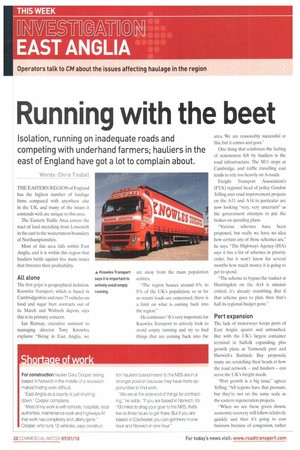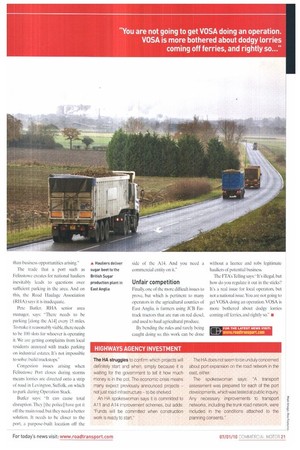Running with the beet
Page 20

Page 21

If you've noticed an error in this article please click here to report it so we can fix it.
Isolation, running on inadequate roads and competing with underhand farmers; hauliers in the east of England have got a lot to complain about.
Words: Chris Tindall THE EASTERN REGION of England has the highest number of haulage firms compared with anywhere else in the UK, and many of the issues it contends with are unique to this area.
The Eastern Traffic Area covers the tract of land stretching from Lowestoft in the east to the westernmost boundary of Northamptonshire.
Most of this area falls within East Anglia, and it is within this region that hauliers battle against five main issues that threaten their profitability.
All alone
The first gripe is geographical isolation. Knowles Transport, which is based in Cambridgeshire and runs 75 vehicles on food and sugar beet contracts out of its March and Wisbech depots, says this is its primary concern.
Ian Ramsay, executive assistant to managing director Tony Knowles, explains: "Being in East Anglia, we are away from the main population centres.
-The region houses around 6% to 8% of the UK's population, so as far as return loads are concerned, there is a limit on what is coming back into the region."
He continues: -It's very important for Knowles Transport to actively look to avoid empty running and try to find things that are coming back into the
area. We are reasonably successful at this, but it comes and goes."
One thing that reinforces the feeling of remoteness felt by hauliers is the road infrastructure. The M11 stops at Cambridge, and traffic travelling east tends to rely too heavily on A-roads
Freight Transport Association's (FFA) regional head of policy Gordon Telling says road improvement projects on the All and A14 in particular are now looking -very, very uncertain" as the government attempts to put the brakes on spending plans.
"Various schemes have been proposed, but really we have no idea how certain any of those schemes are," he says. "The Highways Agency (HA) says it has a list of schemes in priority order, but it won't know for several months how much money it is going to get to spend.
"The scheme to bypass the viaduct at Huntingdon on the A14 is mission critical, it's already crumbling. But if that scheme goes to plan, then that's half its regional budget gone."
Port expansion
The lack of motorways keeps parts of East Anglia quaint and untouched. But with the UK's largest container terminal in Suffolk expanding, plus growth plans at Yarmouth port and Harwich's Bathside Bay proposals, many are scratching their heads at how the road network and hauliers can serve the UK's freight needs.
-Port growth is a big issue," agrees Telling. -All regions have that pressure, but they're not on the same scale as the eastern regeneration projects.
"When we see these green shoots, economic recovery will follow relatively quickly and then it's going to cost business because of congestion, rather
than business opportunities arising."
The trade that a port such as Felixstowe creates for national hauliers inevitably leads to questions over sufficient parking in the area. And on this, the Road Haulage Association (RI-IA) says it is inadequate.
Pete Butler. RHA senior area manager, says: "There needs to he parking [along the A14] every 15 miles. To make it reasonably viable, there needs to be 100 slots for whoever is operating it. We are getting complaints from local residents annoyed with trucks parking on industrial estates. It's not impossible to solve: build truckstops.
Congestion issues arising when Felixstowe Port closes during storms means lorries are directed onto a strip of road in Levington, Suffolk, on which to park during Operation Stack.
Butler says: It can cause total disruption.They [the police] have got it off the main road. but they need a better solution. It needs to be closer to the port, a purpose-built location off the side of the A14. And you need a commercial entity on it."
Unfair competition
Finally, one of the more difficult issues to prove, but which is pertinent to many operators in the agricultural counties of East Anglia, is farmers using JCB Fastrack tractors that are run on red diesel, and used to haul agricultural produce.
By bending the rules and rarely being caught doing so. this work can be done without a licence and robs legitimate hauliers of potential business.
The ETA's Telling says: illegal, but how do you regulate it out in the sticks? its a real issue for local operators, but not a national issue. You are not going to get VOSA doing an operation. VOSA is more bothered about dodgy lorries coming off ferries, and rightly so.• rpe
FOR THE LATEST HEWS VISIT:
imareadtransportcom




























































































































